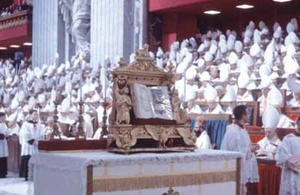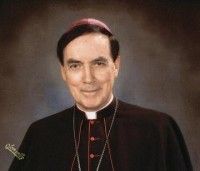In the presence of hundreds of bishops, the Eastern Catholic Patriarchs, ecumenical partners and laity, Pope Benedict prayed the Mass and preached on the meaning of both the Second Vatican Council and the Year of Faith through the lens of conversion. Benedict is clear: the Year of Faith is not celebrating the 50th anniversary of the Second Vatican Council. The Church needs not a special forum for this anniversary; it is all an invitation to conversion and to deepen one's faith in the Christ. The homily Pope Benedict delivered today follows.

Today,
fifty years from the opening of the Second Vatican Ecumenical Council, we begin
with great joy the Year of Faith. I am delighted to greet all of you,
particularly His Holiness Bartholomaois I, Patriarch of Constantinople, and His
Grace Rowan Williams, Archbishop of Canterbury. A special greeting goes to the
Patriarchs and Major Archbishops of the Eastern Catholic Churches, and to the
Presidents of the Bishops' Conferences. In order to evoke the Council, which
some present had the grace to experience for themselves - and I greet them with
particular affection - this celebration has been enriched by several special
signs: the opening procession, intended to recall the memorable one of the
Council Fathers when they entered this Basilica; the enthronement of a copy of
the Book of the Gospels used at the Council; the consignment of the seven final
Messages of the Council, and of the Catechism of the Catholic Church, which I
will do before the final blessing. These signs help us not only to remember,
they also offer us the possibility of going beyond commemorating. They invite
us to enter more deeply into the spiritual movement which characterized Vatican
II, to make it ours and to develop it according to its true meaning. And its
true meaning was and remains faith in Christ, the apostolic faith, animated by
the inner desire to communicate Christ to individuals and all people, in the
Church's pilgrimage along the pathways of history.




